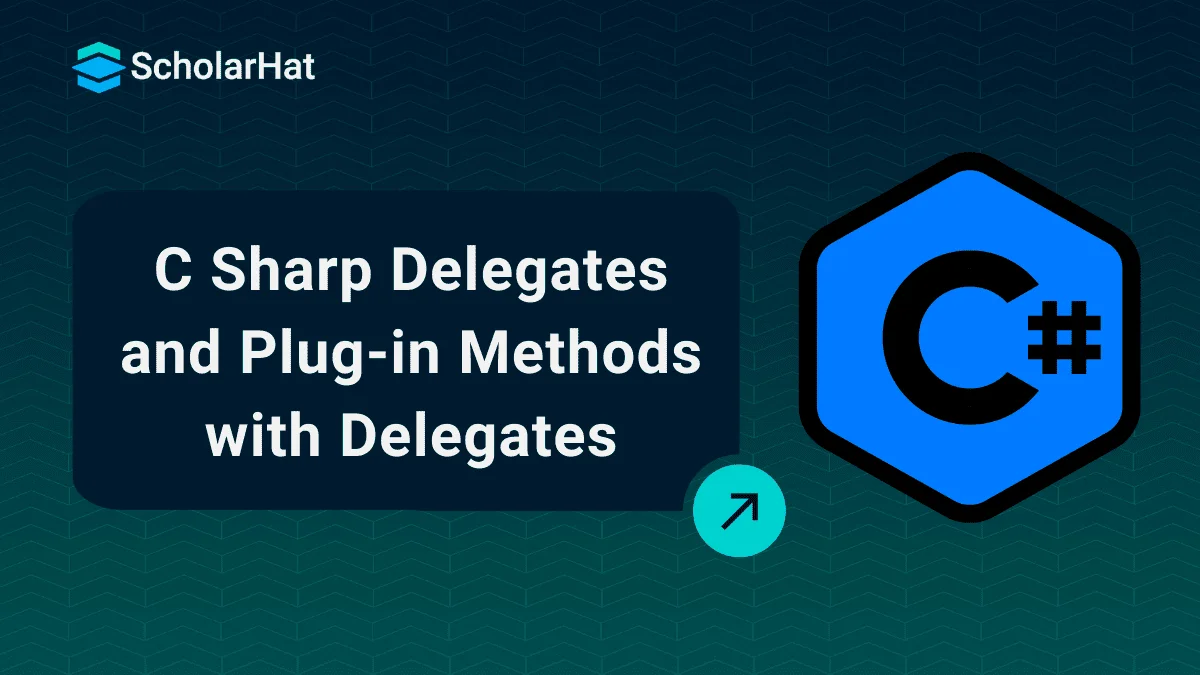06
FebC Sharp Delegates and Plug-in Methods with Delegates
Delegate in C# is a reference type that holds the reference of a class method. Any method that has the same signature as a delegate can be assigned to a delegate. A delegate is like a function pointer. There are three aspects to a delegate: Declaration, Instantiation, and Invocation.
In this C# Tutorial, we will explore more about C Sharp Delegates and Plug-in Methods which will include the Use of delegate, delegate chaining with an example, types of delegates, single cast, and multicast delegates, properties of delegates, delegate with plugin methods. C# skills can boost your salary by 22% in software development roles. Enroll in our Free C# Certification Course today!
Declaration:
A delegate is declared by using the keyword delegate, otherwise it resembles a method declaration.
delegate int delegateAdd (int x,int y); Instantiation:
To create a delegate instance, we need to assign a method (which has the same signature as a delegate) to delegate.
static int Add (int x,int y)
{
return x+y;
}
..
//create delegate instance
delegateAdd objAdd= new delegateAdd (Add);
//short hand for above statement
delegateAdd objAdd=Add; Invocation:
Invoking a delegate is like invoking a regular method.
// Invoke delegate to call method
int result = objAdd.Invoke (3,6);
//short hand for above statement
int result = objAdd (3,6) Read More - C# Interview Questions For Freshers
Plug-in Methods with Delegates
A method can be assigned to a delegate instance dynamically. This is useful for writing plug-in methods. In the below example, The SquareData method has a delegate parameter, for specifying a plug-in SquareData.Let's elaborate on this in C# Compiler.
public delegate int delegateSquare(int x);
class Util
{
public static void SquareData(int[] arr, delegateSquare obj)
{
for (int i = 0; i < arr.Length; i++)
arr[i] = obj(arr[i]);
}
}
class demo
{
static void Main()
{
int[] arr = { 1, 2, 3 };
Util.SquareData(arr, Square); // Dynamically hook in Square
foreach (int i in arr)
Console.Write(i + " "); // 1 4 9
}
static int Square(int x)
{
return x * x;
}
}Types of Delegates
Single cast Delegate
A single cast delegate holds the reference of only a single method. The above-created delegates are single-cast delegates.
Multicast Delegate
A delegate that holds the reference of more than one method is called a multicast delegate. A multicast delegate only contains the reference of methods which return type is void. The + and += operators are used to combine delegate instances.
MyDelegate d = Method1;
d = d + Method2;
//short hand for above statement
d += Method2; Now, Invoking d will call both methods - Method1 and Method2. Methods are invoked in the order in which they are added.
The - and -= operators are used to remove a method from the delegate instances.
d -= Method1; Now, Invoking d will invoke only Method2.
Multicast delegate example
delegate void Delegate_Multicast(int x, int y);
class demo
{
static void Method1(int x, int y)
{
int z=x+y;
Console.WriteLine("Method1 is called");
Console.WriteLine("\n Sum is : {0}",z);
}
static void Method2(int x, int y)
{
int z=x+y;
Console.WriteLine("\n Method2 is called");
Console.WriteLine("\n Sum is : {0}",z);
}
public static void Main()
Delegate_Multicast dmulti = Method1;
dmulti += Method2;
dmulti(1, 2); // Method1 and Method2 are called
dmulti -= Method1;
dmulti(2, 3); // Only Method2 is called
}
}
Output:
Method1 is called
Sum is : 3
Method2 is called
Sum is : 5 Note
Delegates are immutable in nature, so when you call += or -=, a new delegate instance is created and it is assigned to the existing delegate instance.
All delegates are implicitly derived from the System.MulticastDelegate, a class that is inherited from System.Delegate class.
Delegate types are all incompatible with each other, even if their signatures are the same.
delegate void D1(); delegate void D2(); ... D1 d1 = Method1; D2 d2 = d1; // Compile-time error D2 d2 = new D2 (d1); // correctDelegate instances are considered equal if they have the reference of the same method.
delegate void D(); ... D d1 = Method1; D d2 = Method1; Console.WriteLine (d1 == d2); // TrueMulticast delegates are considered equal if they reference the same methods in the same order.
Delegates are used in event handling.
What do you think?
In this article, I try to explain the delegates and their types with examples. I hope after reading this article you will be able to understand delegates.
By 2026, 70% of developer jobs will demand full-stack .NET skills. Stay ahead—enroll in our .NET full stack developer course and dominate the tech market!
FAQs
Take our Csharp skill challenge to evaluate yourself!

In less than 5 minutes, with our skill challenge, you can identify your knowledge gaps and strengths in a given skill.











